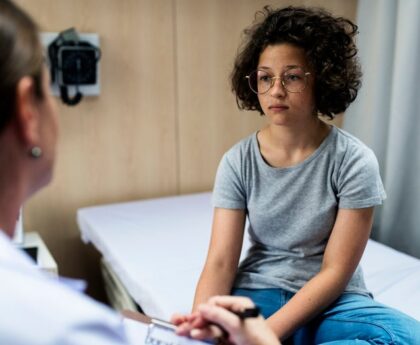One of the biggest downsides of becoming ill with COVID-19 is the inability to be around friends or family during quarantining. But could the virus make it difficult to recognize loved ones at all?
A recent study in the journal Cortex suggests it’s possible. Researchers from Dartmouth College in Hanover, New Hampshire, reported the first instance of prosopagnosia (otherwise known as “face blindness”) as a symptom after COVID-19 infection.
The National Institute of Neurological Disorders and Stroke defines prosopagnosia as “a neurological disorder characterized by the inability to recognize faces.”
PROSOPAGNOSIA: WHAT IS THE FACE BLINDNESS CONDITION THAT BRAD PITT SAYS HE HAS?
The condition is caused by “congenital influence, damage or impairment in a fold in the brain that appears to coordinate the neural systems controlling facial perception and memory,” the website says.
The study focused on a 28-year-old woman named Annie, who contracted COVID in March 2020. Prior to that, Annie had no trouble recognizing faces — but two months after getting the virus, she struggled to identify even her closest family members.
In one example, Annie reported that she was unable to recognize her father’s face when she passed him at a restaurant, saying it was as if “my dad’s voice came out of a stranger’s face.”
She told the researchers she now relies on people’s voices as a means of identification.
During tests, Annie was able to identify objects and scenes, but failed to identify familiar faces.
POST-COVID, CHEST PAINS MAY LINGER FOR UP TO A YEAR, NEW STUDY FINDS
She also reported deficits in her navigational abilities, as she now struggles to find her way through a grocery store, locate her parked car without help or remember directions to frequently visited locations. (The researchers cited navigational difficulty as a common symptom among prosopagnosia patients.)
Researchers also collected survey responses from 54 people with long COVID. A majority reported having problems with visual recognition and navigation abilities.
“Annie’s results indicate that COVID-19 can produce severe and selective neuropsychological impairment similar to deficits seen following brain damage, and it appears that high-level visual impairments are not uncommon in people with long COVID,” the researchers wrote.
Long COVID refers to a condition in which symptoms of the virus persist for longer than 12 weeks after the initial infection.
COVID-19 has been more commonly linked to other neurological symptoms, including the loss of taste and smell, difficulty with speech, visual disturbances and psychosis, the researchers wrote.
Dr. Zachary Hoy, a board-certified pediatric infectious disease specialist at Pediatrix Medical Group in Nashville, Tennessee, who was not involved in the research, pointed out that several studies have emerged describing long COVID’s neurologic impairments.
“This one describes face recognition as one of the main deficits in the case study patient, but goes through to describe several tests used in determining different neurocognitive deficits,” he told Fox News Digital via email.
“I predict we will find more of these studies as more patients with long COVID [are] identified.”
The study did have some limitations. For example, Annie did not get an MRI scan of her brain due to insurance limitations, which means there is a possibility that a stroke could have caused her symptoms.
Annie also was not tested for COVID-19 due to a lack of available test kits; her primary care provider diagnosed her.
“It is unfortunate that in this study, the case control patient did not have COVID PCR testing, COVID antibody testing or brain MRI imaging,” Dr. Hoy of Nashville said.
“Control group members were from a COVID support group, but it did not describe the definition or inclusion/exclusion criteria. It mentions control group members had contracted COVID, but did not describe what that meant in relation to COVID testing.”
CLICK HERE TO SIGN UP FOR OUR HEALTH NEWSLETTER
The doctor added that while this study did a good job of describing the testing and comparisons of several neurocognitive tests, more rigorous testing is needed to strengthen its conclusions.
Fox News Digital reached out to the study authors at Dartmouth for comment.
Article Source: Health From Fox News Read More



